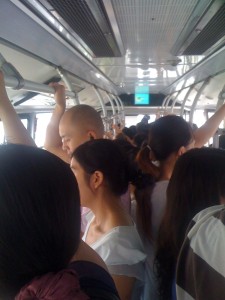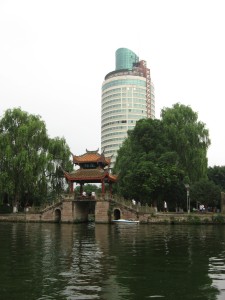An American in Chengdu
New apartment
4 Comments
I moved about a week and a half ago. My first two apartments were provided by my employer, and since I’m no longer employed, I had to strike out on my own. This isn’t such a bad thing, since my new place is nicer than the old one and closer to the university where I’m taking classes.
For the last year I could get help from my school with just about anything: getting things fixed in the apartment, setting up Internet, registering with the police. Now I instead have Mr. Wang, my landlord. I’ve seen Mr. Wang every day or two since moving in. He’s over 60 but knows quite a few English nouns. Occasionally he’ll try piecing together an English sentence, like “Turn off, wait three minutes, open,” but mostly we communicate–or don’t–in Chinese. He drops by with things for the apartment, like a phone, or two impressively ugly bedside tables, or, more strangely, a picture (“I’ll hang this when I have time,” he told me). He’s taken me on little tours of the neighborhood so that I know where to pay the building management fee, the gas bill, and the Internet fee. After the washing machine repairman came by yesterday, Mr. Wang stopped by today just to make sure the machine was really fixed. In short, he’s wildly enthusiastic about being a landlord, which is new and different for me.
The bus
1 Comment
In mid-September, I started Chinese classes at a university on the western edge of Chengdu. Since I was still living near the center, every morning I would squeeze onto one of the buses crawling through the rush hour traffic. 
I couldn’t resist taking this picture, but this is not a post about how crowded those rush-hour buses are. You already know about that. What I find surprising about crowded buses is that after people get on through the back door (something they’re technically not supposed to do, but it’s common during peak times), everyone pays their fare. They give their bus passes or cash to one person, who then passes them to the person in front of her, who continues the relay to the front. Someone at the front of the bus swipes all the cards and puts the notes in the cash slot, and then the cards are passed back and distributed to their owners.
This surprises me because Chinese normally don’t seem very concerned about breaking minor regulations. Run a red light on your motorbike, drive your taxi the wrong way up a one-way street, or get paid under the table, and you’ll have no reason to fear public opprobrium. So why not keep that 30 cents for your next trip?
Another reason I’m impressed with the fare ritual is that pickpocketing is common on these crowded buses. Yet people hand their preloaded fare cards off to a relay line of strangers without apparent concern that anyone might slip one into his pocket. That’s just not done.
Knitting
Leave a Comment
I’ve discovered that a good way to strike up conversations with Chinese strangers is to knit in public. I think this is because Chinese people assume that knitting is a Chinese thing, so they figure that a knitting foreigner must be picking up local habits. On a recent four-day trip from Chengdu to Beijing via Shanxi Province, a man in a bus station mimed knitting and gave me a thumbs-up, and a few women looked at my work and asked what I was making (a dish towel). One day I was knitting in the aisle of a train and turned around to find a male train conductor, a woman, and two preteen girls standing in the doorway of a sleeping compartment and staring at me with rapt attention. One of the girls, who was eating a stick of processed meat, gave me a little wave.
“Ni hao,” I said.
And so it began. Where had I learned to knit? In America, when I was a child. Who taught me? My maternal grandmother’s mother, I said, not knowing the word for great-grandmother. They were impressed by this. How old was I when my great-grandmother taught me how to knit? About 11, I guessed. I explained that my great-grandmother died when she was in her 90s.
Later I reflected how lucky I really was to have known my great-grandmother well enough that she could teach me how to knit (as well as crochet and do counted cross-stitch). And it’s remarkable that knitting helps me connect both with my own ancestors, and to women in a culture that could hardly be more foreign to my own. All thanks to some expat friends who peer-pressured me into re-taking up needles and yarn.
Awesomeness update
Leave a Comment
I have no fun stories to tell today, but thought I’d update my readers (if you don’t know already, because you’re my mom) about the latest developments here. Right now I’m essentially on a two-month paid vacation, though apart from the trip to Nanchong, I haven’t done anything particularly vacation-y yet. I’ve been keeping surprisingly busy with some remaining editing, with getting things lined up for the fall, and with some personal projects. But it’s a good time to Skype me, if you’re so inclined.
My plan for this fall is to take Chinese classes at a local university and support myself by editing papers that Chinese researchers write in English to submit to international journals. There’s a big demand for that here. I’ve enjoyed working at the medical school (also, having months and months of paid vacation from the medical school, and a free apartment), but working full-time hasn’t left me with enough time to study.
Here are some awesome things that have happened recently:
- Two months paid vacation
- My lovely parents gave me money for a plane ticket home. I’ll be visiting Ithaca, DC, and Colorado starting August 10.
- I asked the school whether I could stay in my apartment for an extra month, so that I won’t have to pack everything up and find a place to put it before I leave for the U.S., but can move at the end of September instead. They said yes.
- I got a full-tuition scholarship from the university where I’ll be studying Chinese next semester. This isn’t actually a signal that I’m awesome; the scholarship isn’t terribly competitive. But it is free money!
There are also some annoying bureaucratic things that have happened recently, but when I started to list them, in the most bare-bones way possible, it was just so boring that I stopped myself. You’re welcome.
Nanchong
Leave a Comment
Last week I went with Cecilia to stay at her mother’s place in Nanchong. Nanchong is a little over two hours from Chengdu, one of those vast Chinese metropolises you’ve probably never heard of. It has a ridiculously wide river and some mountains along the edge of town and decent air quality, but overall, there’s probably a good reason why I’d never heard of it before I was invited to visit. We went to a few tourist attractions, which mostly consisted of reconstructed old-timey buildings in the aforementioned mountains, but mostly what I did in my two and a half days in the city was eat, sleep, crochet, and read.
One highlight was my visit to Cecilia’s mother’s workplace, which is a pig farm. Yes, not to fear, I’m still a nerd/science writer at heart. We didn’t get to see any actual pigs at the industrial pig farm, but we (we being Cecilia, her cousin Phoebe, her sort of adopted brother, who I’ll call Didi, and me) got a personal talk in a conference room about the operation, complete with video. I learned that about 60% of China’s pigs now come from big industrial pig farms, while the rest are still raised on small farms. This particular pig farm is flexing its industrial muscle by importing breeders and frozen pig sperm from a partner operation in Canada. The pigs live indoors and are subject to stringent “biosecurity” measures. For example, before someone can go into the piglet area, they have to spend more than 24 hours in a kind of quarantine room, except that the object is not to make sure they’re not sick, but to make sure that any pig pathogens they might be carrying have died. Then they work in the piglet barn for 30 days straight before their next furlough.
I asked about cows. Apparently most of the dairy in China comes from two big industrial farms, one in Xinjiang and the other in Inner Mongolia. But cow farms cause a lot of erosion, at least when they’re close to rivers, and much of China’s non-mountainous land is close to rivers, so the government hasn’t permitted more industrial farms for cows. At least that’s my understanding. So I, the smoothie-drinking vegetarian, am supporting nasty industrial dairy farms, while China’s beef eaters are potentially eating someone’s grass-fed backyard cow.
Another highlight of my visit was watching Didi’s father do calligraphy. He’s very good, I gather, and after we watched him demonstrate he insisted on giving me a finished scroll off his own wall. Later Cecilia’s mother mentioned that he’d given her a piece, too… after her hysterectomy.
Being a guest in China can be a little overwhelming: life seemed to revolve around me all the time I was there, and I wasn’t allowed to pay for anything, even my own transportation from and to Chengdu. I was concerned about upholding my side of the bargain: what could I possibly ever do to repay these people for their kindness? I didn’t even have the words to be sufficiently effusive in my thanks. I also became concerned on behalf of the entire Western world, which surely isn’t holding up its side as far as hospitality goes. If this is the norm for guest treatment in China, how un-welcomed must Chinese feel when they go to America?
Coffee
2 Comments
A few weeks ago, to mark the belated start of smoothie season, I went looking for a blender at the French supermarket Carrefour. It’s hard to avoid getting “helped” at the supermarket if you’re looking at anything at all expensive (e.g., electric blankets, wine, tea), but I thought I might have escaped when I walked purposefully past a group of staff in the small appliance section and none said a word to me. But I didn’t get far before I was chased down by a guy I took to be the designated foreigner consultant.
“What do you want to buy?” he asked in Chinese.
Me: “I don’t know how to say it.”
Him: “Coffee machine?”
Me: “No.”
Him: (in English) “Blender?”
We foreigners are pretty predictable, apparently.
It’s not that the Chinese don’t drink coffee, but for everyday sipping, they usually go with pre-sweetened, fake-creamered instant. Brewed coffee, and certainly anything involving espresso, is a luxury one finds at Western restaurants, Starbucks, or upscale domestic coffee houses. Starbucks prices are about the same here as they are in the States, which means a latte or cappuccino runs around 30-35 yuan. By comparison, my usual breakfast (two large steamed buns and a cup of soy milk) costs 2 yuan; a bowl of noodles in a hole-in-the-wall restaurant costs about 5 yuan, and a short taxi ride costs around 10 yuan.
Even Nescafe, which costs around 1 yuan per serving if you buy it in a box at the supermarket, seems to be cultivating its cachet. Just as some moon cakes come in elaborate packages to be given as gifts, there are shiny golden Nescafe gift boxes that you can use to show your esteem.
This post is dedicated to Joey, who suggested I blog about coffee. He was probably kidding.
Paying respects
2 Comments
When someone dies in China, their family sets up a white tent outside their home with folding chairs and tables and, on the back wall of the tent, a picture of the deceased. Friends send big paper wreaths, which the family displays, and come by the tent to pay their respects. To me paying respects doesn’t look much different from what the Sichuanese do when they’re not grieving: they drink tea, eat peanuts and sunflower seeds and toss the shells on the ground, chat, and play cards. The tent stays up for a few days, with people inside at all hours, and then abruptly disappears. There must be a company that rents them out.
There was a tent in my building’s courtyard last week, and I snapped this picture discreetly from a window. But the whole set-up disappeared before I could get a picture of the wreaths.
Jiuzhaigou
Leave a Comment
About a month ago my mom and grandma (who happen to be two of my blog’s most frequent visitors–hi!) came to see me. The first thing we did was fly north to Jiuzhaigou.
Now, I don’t think Coloradans are snobby about very many things. Our state is not a financial or political center, and South Park doesn’t exactly make us a cultural hub, either (a point nicely illustrated by the “sex and coke party” scene from this episode, where the kids get introduced to Colorado’s celebrities). I have, however, occasionally caught myself making a comment to the effect that “that’s not a mountain.” Because Coloradans think we know from mountains.
So it is with some sadness that I report that Jiuzhaigou is much, much prettier than anyplace I’ve seen in Colorado. It’s an area in northern Sichuan that’s populated mainly by Tibetans (there were more Tibetans there before Jiuzhaigou became a national park, but that’s another tangent). Like any tourist site in China, it’s swarming with tourists. And it’s incredible. A small sample:
My grandmother was a big celebrity in Jiuzhaigou. People were impressed that she was healthy enough to go trekking around in the mountains. They took pictures of her and with her, and asked how old she was (answer: 80).
Shining English
1 Comment
In high school I was a Lincoln-Douglas debater, and spent many Saturdays in various Colorado high schools arguing about the individual versus the collective, feminism, individual rights versus state stability, censorship–all topics about which no one really needs to hear a high schooler’s opinion. Accordingly, usually the only other people in the room when I debated were my opponent and the judge, though final rounds might garner more of an audience. The drama and comedy events would draw spectators, but only teammates who’d already committed to spending Saturday in the high school. Even our parents wouldn’t think to show up unless we made it to a big tournament like State or National Qualifying.
So I was pleasantly surprised when I first agreed to help judge a “Shining English” speaking competition a few months ago for the campus English club, and found it was designed to be entertaining. Held in a large room full of uncoerced spectators, it was set up like a TV show, complete with smartly-dressed MCs (one male, one female), visual effects (projected onto a screen on the side of the stage), and decorations.
On Friday I judged my second Shining English event, this one a drama competition. It started out with dramatic music and some scripted conversation between the MCs (“Vivian, have you seen the movie Avatar?” “Why yes, I have” “Do you remember when X character says to Y character, ‘you’re not in Kansas anymore’?”), then quickly segued into a play by the first of the eight teams, a sort of CliffsNotes version of the Wizard of Oz. In all eight plays the performers lip-synced along with dialogue tracks they’d pre-recorded, which I thought must increase the level of difficulty significantly. Most included impressive costuming and at least one dance number. Some threw in fake commercial breaks for laughs. All this in about 10 minutes each.
In my favorite play (which took second place), James Bond moonwalked onto the stage where the evil queen was consulting her talking mirror, and agreed to assassinate Snow White. However, when he showed up at her door disguised as a deliveryman and bearing poisoned Haagen Daas, Snow White insisted that he try some too. Then Bond returned for a quick interlude with his wife like Patrick Swayze in Ghost (complete with a few bars of Unchained Melody) before he was whisked off to the afterlife to join a game of poker. Then the whole cast joined in a dance number set to Lady Gaga’s “Poker Face.”
Traffic 2
1 Comment
One-way streets are proliferating in Chengdu these days, and for the past few weeks I’ve been watching one of the streets between home and work change from two-way to one-way. The old street had one car lane and one bike lane going each way. The first step was to replace the lane lines so that the new street had three car lanes and one bike lane going one way, and one bike lane going the other way. I was happy that bikes were to be officially allowed to go both ways, although given the popularity of the bike lane for such activities as parking and walking, I knew I’d need to use the oncoming car lane frequently. However, once the lines were in place cars continued driving both ways as usual.
A few days later, the powers that be installed a traffic light at a 3-way intersection that was previously controlled only by a stop sign. The light was far more successful than the lines in garnering drivers’ attention; even the cars going the wrong way stopped, though their drivers couldn’t see the signal. They stopped when the walk signal was red. Once the signal turned green, they kept driving the wrong way.
As a few more days passed, the traffic going the right way became heavier than that in the reverse direction. But the city buses were still going the wrong way in what seemed an official enough acknowledgment of the street’s continuing two-way status.

Finally, near the end of last week, the city put up temporary do-not-enter signs and posted traffic directors at intersections to discourage would-be wrong-way drivers. The bus stops on the wrong side had signs announcing new routes. It was the end of an era.
Or maybe not quite. As I biked home on Friday an ambulance passed me going the wrong way. It was traveling away from the hospital and its lights weren’t on. It passed a couple of crashed motorcycles and their drivers, who looked to have sideswiped each other while going the wrong way (fortunately, they didn’t look seriously hurt).











